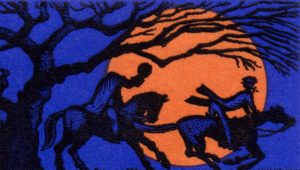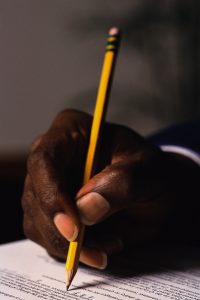Registration for Spring 2019 is here, and English has just what you need, whether you want to curl up with a good book, work on your stand-up routine, or finally pen that perfect sonnet. Scroll down for a taste of our offerings… and please visit plus.hope.edu for a complete list. We’d love for you to join us!
English 371-01: “Ernest Hemingway: Fiction and Film” – MWF 11:00-11:50 with Dr. Hemenway
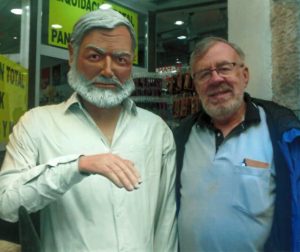 For more than seven decades, people have asked me if I am the illegitimate son of Ernest Hemingway. No, I am not; we spell our names differently. However, I have come to terms with this mysterious and macho man. In “Ernest Hemingway: Fiction and Film,” I will present several of his short stories and novels and Hollywood versions of them to help you grapple with his “lean, hard, athletic narrative prose that puts more literary English to shame” (New York Times, 1926) and the “technicolor adaptations featuring foreign settings and doomed love, and always at least half an hour too long” (Slate, 2007). English majors will encounter “Lost Generation” themes and techniques, Creative Writing students will imitate his economical realism, Secondary Education students will emerge with lesson plans for teaching such classic high-school texts as A Farewell to Arms and The Old Man and the Sea. Scientists, Women’s Studies and Psychology majors, Midwesterners, film buffs, travelers, and adventure-seekers will all find something of interest.
For more than seven decades, people have asked me if I am the illegitimate son of Ernest Hemingway. No, I am not; we spell our names differently. However, I have come to terms with this mysterious and macho man. In “Ernest Hemingway: Fiction and Film,” I will present several of his short stories and novels and Hollywood versions of them to help you grapple with his “lean, hard, athletic narrative prose that puts more literary English to shame” (New York Times, 1926) and the “technicolor adaptations featuring foreign settings and doomed love, and always at least half an hour too long” (Slate, 2007). English majors will encounter “Lost Generation” themes and techniques, Creative Writing students will imitate his economical realism, Secondary Education students will emerge with lesson plans for teaching such classic high-school texts as A Farewell to Arms and The Old Man and the Sea. Scientists, Women’s Studies and Psychology majors, Midwesterners, film buffs, travelers, and adventure-seekers will all find something of interest.
English 240: “Comedy Writing” – Tu/Th 12:00-1:20 with Dr. Pannapacker
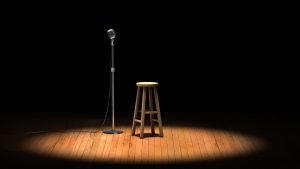 This is a hybrid course about the history and practice of comedy writing that focuses on writers and performers of the last sixty years in their cultural contexts (e.g., Lenny Bruce, George Carlin, Richard Pryor, Steve Martin, Chris Rock, Jerry Seinfeld, Tina Fey, Amy Schumer). You will write reaction essays and give short presentations on the comedians we are studying, and write one longer essay on a relevant topic of your choosing. Additionally, you will develop at least one comedic persona — drawing upon the techniques of famous performers — using social media to develop “bits” for use in larger comedic “sets” that you will present to the class for periodic feedback. This is not a course in performance, but you are likely to develop stronger delivery skills. By the end of the course, you should have an organized understanding of the history of U.S. comedy writing, a repertoire of writing and delivery techniques, and an emerging “fan base” for your work that can be developed for careers in writing for performance, print, and other media.
This is a hybrid course about the history and practice of comedy writing that focuses on writers and performers of the last sixty years in their cultural contexts (e.g., Lenny Bruce, George Carlin, Richard Pryor, Steve Martin, Chris Rock, Jerry Seinfeld, Tina Fey, Amy Schumer). You will write reaction essays and give short presentations on the comedians we are studying, and write one longer essay on a relevant topic of your choosing. Additionally, you will develop at least one comedic persona — drawing upon the techniques of famous performers — using social media to develop “bits” for use in larger comedic “sets” that you will present to the class for periodic feedback. This is not a course in performance, but you are likely to develop stronger delivery skills. By the end of the course, you should have an organized understanding of the history of U.S. comedy writing, a repertoire of writing and delivery techniques, and an emerging “fan base” for your work that can be developed for careers in writing for performance, print, and other media.
English 354: “Intermediate Creative Writing: Fiction” – Tu/Th 1:30-2:50 with Dr. Childress
According to Flannery O’Connor, “A story is a way to say something that can’t be said any other way.” She also said, “I write to discover what I know.” And also: “You shall know the truth and the truth shall make you odd.”
So this is your chance: discover what you know by saying something that can’t be said any other way, and, of course, let your weird out! We’ll closely examine—as writers who are looking to steal their secrets—short stories from O’Conner and other literary giants in this genre, both classic and contemporary. We’ll undertake exercises to develop your characters, push your plot lines, and make your dialogue do good and gritty work. We’ll engage in class critique. Come prepared to read and to write—lots and lots of each! You’ll write three short stories, try your hand at microfiction, introduce your classmates to a literary journal with fantastic short fiction, and turn in a final portfolio of roughly 30 radically revised pages.
So come discover what you know, and let the truth set you strange…
English 282: “American Ethnic Literature” (focus on Asian American Literature) – Tu/Th 12:00-1:20PM with Dr. Cho
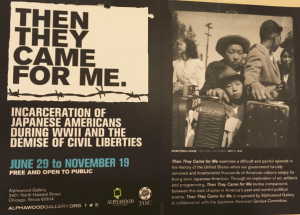 Asian American Identity? The birth of the fortune cookie? A people group which profoundly shaped immigration and naturalization laws? The “hula-hula” dance, palm trees, and pineapples? The earliest known date of Asian migration to the US (1565, if you can believe it)? Japanese American internment? The origins of Korean adoption? The origins of surfing? Why TV shows Gilligan’s Island, Fantasy Island, and Lost were set in the Pacific? A Japanese American Black Panther? The origins of the term “Asian American?” Asian American Civil Rights leaders? Interested? See you soon…
Asian American Identity? The birth of the fortune cookie? A people group which profoundly shaped immigration and naturalization laws? The “hula-hula” dance, palm trees, and pineapples? The earliest known date of Asian migration to the US (1565, if you can believe it)? Japanese American internment? The origins of Korean adoption? The origins of surfing? Why TV shows Gilligan’s Island, Fantasy Island, and Lost were set in the Pacific? A Japanese American Black Panther? The origins of the term “Asian American?” Asian American Civil Rights leaders? Interested? See you soon…
English 375: “Young Adult Ethnic American Literature” – Tu/Th 12:00-1:20 with Dr. Montaño
In this course, we will analyze Ethnic American literature for young adults. The goal will be to explore a wide range of perspectives, from a young girl growing up in Chicago who refuses to be perfect; a young boy growing up wondering which parts are Chinese and which American; two stories about 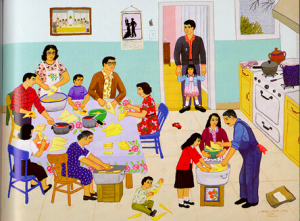 Hispaniola (one Dominican and the other Haitian); and two surrealismo novels of young adults caught between worlds as well as familia.
Hispaniola (one Dominican and the other Haitian); and two surrealismo novels of young adults caught between worlds as well as familia.
This course will emphasize critical issues surrounding the renaissance of multicultural literature. Due to the novel nature of this approach, time and weight will be given to questions of intercultural production, intertextuality, historicism, and diversity in America. By exploring literature for young adults in this manner, we hope to raise fundamental questions over the very essence of our world and how we see it.
Extensive reading and discussion required, as well as written responses through various critical perspectives, multimedia presentations, and a larger final project. Meets Hope College GLD credit.
English 455-01: “Advanced Poetry” – Tu/Th 9:30-10:50 with Dr. Peschiera
Poetry is at the absolute, razor-sharp, leading edge of art. It’s also where everyone goes to express and recall profound emotion. It is popular and populist, and also elite and exclusionary. How can it be both? We’ll answer that question. You’ll write poems and talk about poems, writing for both popular and elite purposes, thinking about how your poetry can fill both spaces. We’ll discuss structure, rhythm, and sound, all while further developing your poet’s voice. You’ll print a small collection of your work. We’ll have writers and song writers visit us in person and on video chat, and watch videos about our poetry and poetics. But mostly you’ll talk about each other’s work every day, and read poems and essays about poetry. Sharpen the pencils, refill the pens!


